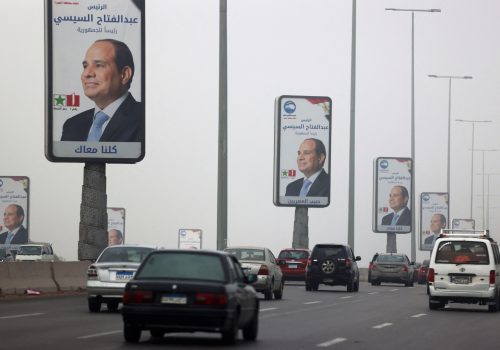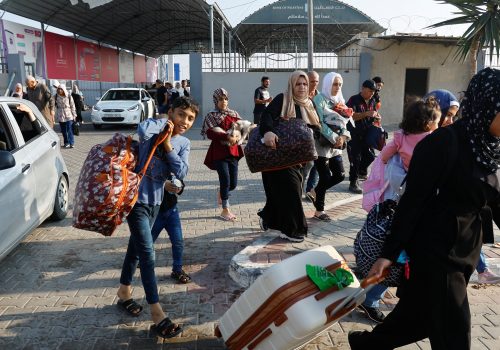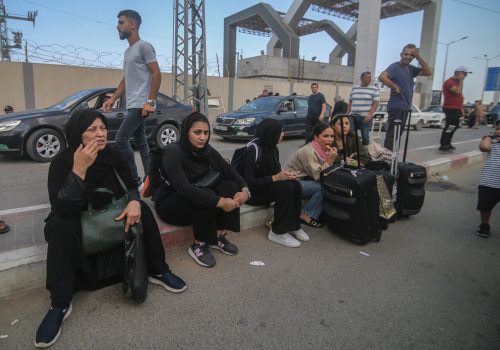Egypt was mediating a deal to end the Gaza war. Then Saleh Al-Arouri was assassinated.
As Israel’s relentless onslaught on the Gaza Strip enters its fourth month, Egypt—which is suffering the ramifications of the ongoing war on its northern border—has, in recent weeks ramped up its mediation efforts to broker a permanent ceasefire. But despite inching closer to a new hostage release deal, the assassination of Hamas’ Deputy Leader Saleh Al-Arouri on January 2 has not just piled new pressures on Egypt which was already feeling the pinch of an unprecedented economic crisis, but has also thrown a towel over Egyptian mediation talks.
Tourism, one of Egypt’s primary sources of income, has been dealt a blow through a surge in trip cancellations—particularly to South Sinai which was reported in recent weeks by Egyptian tour operators. Suez Canal revenues have also plummeted as a result of the reduced shipping traffic, owing to recurring attacks on ships passing through the Red Sea by Iranian-backed Houthi militants.
In recent days, several global shipping companies have suspended shipping through the Suez Canal “until further notice,” citing security concerns. A missile attack on the Maersk Hangzhou, a container ship, by Houthi militias on December 30, 2023, marked the twenty-third attack on ships crossing the Red Sea since the start of the war on October 7, 2023. The suspensions and the slump in tourism have added to the country’s economic woes—Egypt is grappling with an acute foreign currency shortage and a staggering foreign debt amounting to $164.73 billion by the end of June 2023—thus, requiring Cairo to do all it can to resolve the Israel-Gaza conflict and prevent it from escalating into a wider war.
Growing calls by some ultra-nationalist Israeli officials to displace Palestinians into Egypt’s Sinai Peninsula—a suggestion that’s been categorically rejected by Egypt as “a red line” that would undermine its national security—have also given impetus to Cairo’s efforts to end the conflict and avert a possible standoff with Israel over the contentious issue. President Abdel Fattah el-Sisi, who won a third term in office in the December 2023 elections (he secured a landslide victory against three little-known rival contestants), knows only too well that giving his nod of approval to the displacement of Palestinians would provoke the ire of Egyptians and may even threaten to destabilize the country.
The majority of Egyptians—enraged by the scenes of Gaza’s destruction and corpses of children being pulled out from the rubble—have thrown their weight behind the Palestinians. Many Egyptians also back Hamas, perceiving the Palestinian militant group as a resistance movement fighting against a brutal occupation. While there is no love lost between Sisi and Hamas—the Egyptian president sees the Palestinian militant group as an affiliate of the Muslim Brotherhood, the Islamist group he helped overthrow in 2013, which has since been designated a terrorist group by Egypt—the Egyptian people’s solidarity with beleaguered Palestinians in the Gaza Strip has prompted Sisi to tread cautiously. As a result, he has been using one narrative with Israeli officials and another pacifying narrative at home.
The pressure from all sides has spurred Sisi into action, causing Cairo to intensify its efforts to broker a permanent ceasefire. Keen on regaining its traditional leadership role as chief mediator between Israel and the Palestinians, Cairo has put forward a three-stage plan to end the conflict.
The Egyptian plan suggests an initial, temporary truce of one to two weeks that would be extended after each phase. The temporary halt in fighting would allow for the release of hostages in exchange for Palestinians held in Israeli prisons and for the delivery of humanitarian aid into Gaza. It would also enable displaced Palestinians, who were ordered by the Israel Defense Forces (IDF) to evacuate to the south, to return to northern Gaza, and for the hostages to be released in batches: first, women, children, and elderly citizens, then, women soldiers, and, finally, all remaining hostages in exchange for an unspecified number of Palestinian prisoners. In the second stage of the plan, corpses of Israeli hostages who died while in captivity would be exchanged for the bodies of Palestinians who have died in Israeli jails. The final stage of the plan would see the withdrawal of IDF troops from the Gaza Strip, paving the way for a permanent ceasefire that Diaa Rashwan, head of the State Information Service, told Al Sharq Al Awsat “would restore peace and stability to the region.”
The proposal, which also suggests that Hamas relinquish power in a post-war Gaza Strip, was initially met with a frosty reception from the Palestinian militant group, according to an Egyptian security source who spoke to me on condition of anonymity. In recent days, however, it had appeared to be gaining traction with both Israel and Hamas.
“Hamas and [Palestinian] Islamic Jihad, which held talks with Egyptian mediators in Cairo in late December, remain unwavering in their position not to negotiate a prisoner exchange before there’s a cessation in hostilities and all IDF troops withdraw from Gaza,” Ghazi Fakhry Murrar, a member of the Palestinian National Council who resides in Cairo, told me. Hamas leaders also insist that the Palestinian people should elect their leaders.
Despite Hamas’ seeming intransigence, Al Sharq Al Awsat reported on January 1 that a breakthrough in mediation talks was imminent as the two sides moved closer to sealing a prisoner exchange deal mediated by Egypt and Qatar. The news site added that Hamas and Palestinian Islamic Jihad—the two Palestinian factions that are at war with Israel—were “open” to the Egyptian proposal, which would be implemented after coordination with the concerned parties. Al Sharq Al Awsat quoted Israeli Public Radio as saying that Hamas had privately agreed to a month-long truce despite making public statements insisting on a complete cessation of hostilities to move forward with a new hostage exchange deal.
The Egyptian mediation efforts had appeared to be making headway up until the January 2 assassination of Arouri in a drone strike on a southern Beirut suburb, derailing talks between Egyptian intelligence officials and a visiting Israeli delegation to broker a new hostage release deal. Quoting Qatari sources, Sky News Arabia reported on January 3 that Egyptian officials had informed the Israeli government of their decision to halt mediation efforts in protest of Arouri’s assassination. This decision prompted the Israeli delegation to cut its visit short and return home without clinching a deal.
All signs now point to an escalation in the war that has dragged on since October 7, 2023, leaving Egypt’s mediation talks in limbo and putting the Egyptian leadership under additional strain. Israel refuses to back down until it eliminates Hamas and dismantles the group’s military capabilities—goals that many analysts argue are unrealistic or close to impossible to achieve. Israel’s targeted assassinations of Hamas and Iranian-backed Hezbollah figures are only exacerbating the crisis,” Murrar told me. “Such provocations are widening the conflict and are threatening to destabilize the entire region.”
As Israel’s war looks set to expand to new fronts with Lebanon, Syria, and possibly even Iran in the coming weeks, Egypt’s mediation efforts have been left hanging in the balance. Even if Israel was willing at any point in time to hold a temporary truce to release the nearly 130 hostages still held captive by Hamas, it would be more likely to opt for Qatari mediation, said a political science professor who preferred to remain anonymous for fear of reprisal. On January 2, Qatar, which hosts the largest US military facility in the Middle East at its Al Udeid Air Base, struck a deal with the United States to extend US military presence at the base for another ten years. Doha has also been hosting Hamas’ leadership since 2012 and, thus, has greater leverage with the militant group, he explained.
It looks like the Egyptian proposal may be shelved—at least for now.
Shahira Amin is a nonresident senior fellow at the Atlantic Council’s Scowcroft Middle East Security Initiative and an independent journalist based in Cairo. A former contributor to CNN’s Inside Africa, Amin has been covering the development in post-revolution Egypt for several outlets, including Index on Censorship and Al-Monitor. Follow her on X: @sherryamin13.
Further reading
Thu, Dec 7, 2023
President Sisi’s third term will be his biggest challenge—not the upcoming Egyptian election
MENASource By Shahira Amin
While it is certain that Abdel Fattah el-Sisi will win a third term, it is uncertain what will happen after the vote and when the Gaza war is over.
Fri, Nov 3, 2023
As the Gaza war continues, Egypt is facing pressure to act
MENASource By Shahira Amin
As Israel expands its ground raids in the Gaza Strip, Egypt is witnessing the ripple effects of the war and faces growing pressure to act in regard to Palestinian refugees.
Sat, Oct 14, 2023
Egypt cornered over Israel’s war on Hamas
MENASource By Shahira Amin
Whether Egyptian President Abdel Fattah el-Sisi will bow under US and Israeli pressure remains to be seen.
Image: Displaced Palestinians, who fled their houses due to Israeli strikes, shelter near the border with Egypt, in Rafah in the southern Gaza Strip, January 7, 2024. REUTERS/Ibraheem Abu Mustafa


